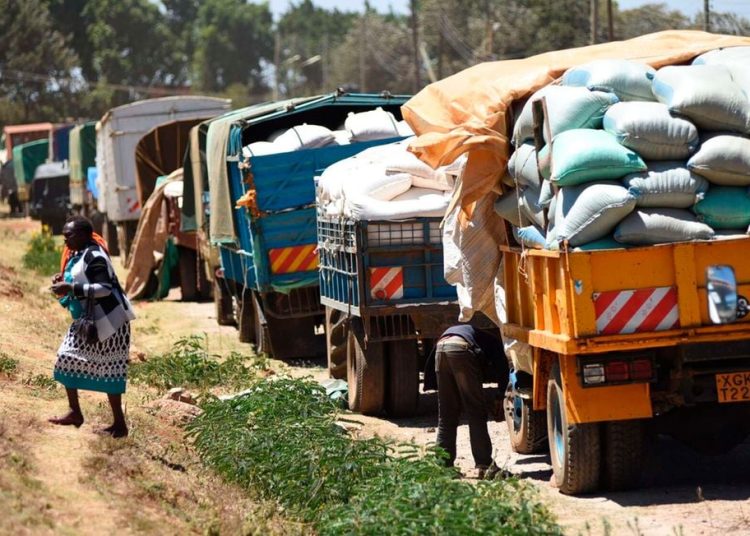East African economies are losing millions of dollars as stiff trading policies, including slow implementation of agreed taxation rules, yet again force a drop in intra-regional commerce.
A new report on regional commerce shows that policymakers have not been putting their words into action, agreeing on significant policies but delaying implementation.
In turn, this has seen East African Community member states frequently flout the Common Market Protocol and undermine the regional integration agenda through imposition of non-tariff barriers (NTBs) to trade and repeated requests for preferential tax treatment and exemptions.
The Intra-EAC Trade Brief Analysis report by the East African Business Council (EABC) shows that the value of trade among the EAC members states fell by more than 33 percent ($1.8 billion) to $3.6 billion in 2022, from $5.4 billion in 2021.
The report seen by The EastAfrican shows the intra-EAC trade was mainly impacted by trade in cereals, which fell to $285.5 million from $607.2 million and trade in mineral fuels, which fell to $175.1 million from $618.2 million in the period.
Trade in sorghum and rice declined, but intra-export trade in maize increased by 63 percent to $187.1 million from $114.6 million.
EABC says restrictive trade practices, failure to fully implement the revised Common External Tariff (CET), high cost of doing business, over-reliance on foreign currencies and rain-fed agriculture are other major obstacles to flourishing regional trade.
Others are the spillover effects of global shocks that have exacerbated food insecurity by disrupting supply of key commodities such as fuel, fertiliser and wheat.
In 2022, Kenya waived import duty on edible oil against the EAC common external tariff rules, a decision opposed by the Kenya Association of Manufacturers (KAM).
Kenya’s Trade ministry allowed importation of cooking oil duty-free for one year despite implementation of the EAC-CET trade regime that puts imported finished goods such as edible oil in a tax band that attracts a 35 percent import duty to promote local producers.
In June, Trade Cabinet Secretary Moses Kuria wrote to Treasury Cabinet Secretary Prof Njuguna Ndung’u, proposed to remove the 35 percent duty and replace it with a 10 percent export and investment promotion levy on imported crude oil.
The High Court blocked implementation, pending hearing and determination of a judicial review.
Kenya has imposed import tax on a number of products, including packaging paper, clinker and metal products, a move that has been questioned by manufacturers in the country.
“KAM is concerned with the whole philosophy of imposing levies on imported raw materials and intermediate products ostensibly to promote exports,” Rajan Shah, KAM chairman, told The East African.
“We have had a review of CET on paper. That stay of application on paper is of paper, which is not produced in the East African region. The direct impact of that is taken from 10 to 25 percent by Kenyans. It will affect the price of a packet of unga (maize flour) which will go up by Ksh6 ($0.04),” said Shah.
The EAC gazette notice released on June 30 includes a CET of 35 percent on imported paper.
“That is one of the negative impacts we are seeing coming out of the latest EAC gazette notice,” Shah added.
KAM is concerned by the proposal to impose a 10 percent export levy on imported Kraft, a type of water-soluble paper used in packaging and shipping bags.
“Kraft liner is used in packaging of staple foods such as maize, wheat, cassava, millet flour among others. The proposed levy will have a direct negative impact of increasing the cost of packaging Unga. This will increase the cost of unga for consumers and comes at a time when mwananchi (countryman) is unable to put up with the inflated cost,” explained Shah.
The EAC has adopted a new four-band tariff structure, which came into force on July 1, 2022 with hopes of eliminating the frequent use of Stays of Applications by partner states and to help promote intra-regional trade, investments and employment creation.
Under the revised tariff structure, raw materials and capital goods attract no import duty while intermediate products not available in the EAC region attract a 10 per cent levy. Intermediate products available in the region attract 25 percent duty while imported finished products attract a 35 percent import levy.
Sensitive items attract a duty higher than 35 percent.
According to the EAC Secretariat, the 35 percent duty on finished products has the potential of growing the intra-EAC trade by $18.9 million, adding 6,781 jobs and growing EA’s tax revenues by 5.5 percent.
The EABC has scheduled a forum in Kampala to push for regional integration and increased intra-EAC trade from August 31 to September 1.
It will drum up support for elimination of barriers to trade and investment.
For instance, Kenya has been imposed restrictions on Ugandan milk, which is cheaper due to lower cost of production, prompting President Yoweri Museveni’s administration to seek for new markets in North and West Africa.
South Sudan recently banned maize from Uganda while Tanzania has temporarily suspended issuance of permits to Ugandan traders who export rice and maize flour from the country.
On preferential tax treatment, virtually all EAC member states seek tax favours to protect their industries.
For instance, Tanzania has demanded delay in implementing the regional CET rate of 50 percent. Dar will continue to apply a duty rate of 35 percent for one year on vitenge fabric while Uganda has to similarly delay zero-rating and apply a duty rate of 10 percent for one year; on mobile phones.
On the other hand, Kenya will stay application of EAC CET rate of zero percent and apply a duty rate of 25 percent for one year on mobile phones.
Uganda has also sought to assign ‘ginger’ as a sensitive item for one year; and to stay application of the EAC CET rate of 35 percent and apply a duty rate of 60 percent for one year.













